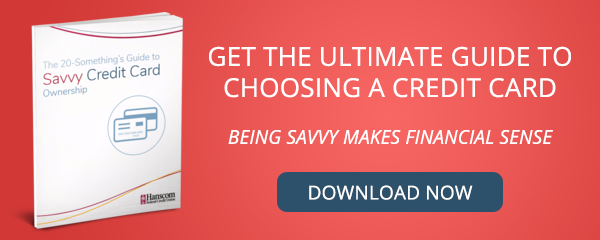Ok, you're muttering to yourself: What could possibly be good about a credit card with a higher interest rate? But hear me out. There are actually 3 good reasons a high-interest credit card can work to your benefit:
1. A Card With a High Interest Rate Doesn't Cost You Anything If You Pay It Off In Full Every Month.
Earlier this year I was pre-approved for a card that came with some pretty sweet perks and benefits, but I was dismayed when I saw the interest rate. It wasn't exorbitant, but I've got cards with lower rates. At first glance, the card didn't seem like such a great deal.
But after a few moments thinking about it, I realized a higher interest rate didn't matter. I pay my credit cards in full each month, so I could reap this new card's benefits without paying a penny of interest. This card also happened to have no annual fee, so there was really no downside for me...and a free round-trip ticket to Europe to look forward to.
Cards that offer points, perks, and other amenities do tend to charge a higher amount of interest than a card that simply gives you a credit line. If you tend to carry balances on your cards, then a higher interest rate doesn't make sense, unless the perks are so awesome you're willing to pay a premium for them.
So if you, like me, pay your cards off in full each month and you'd like to like to reap a few more benefits, think about upgrading.
Our CASH + REWARDS World Mastercard® is a good example. While our Platinum Mastercard has a low APR1 of 8.49%, our CASH + REWARDS World Mastercard has a variable rate of 10.24%2 but offers unlimited 1% cash back and a variety of award categories including cash back, gift cards, merchandise, travel, green products, experiences, charitable donations, and more...things you won't get with the lower rate Platinum Mastercard.
If you're spending the money anyway, doesn't it make sense to squeeze as much out of it as you can?
2. It's An Option If You Have No Credit...Or Poor Credit.
We've all been there, at least in the "no credit" category. Maybe you've just graduated from college, landed your first job, and are looking around for your first credit card. Or on the other hand, you experienced a life crisis and your credit score took a deep dive. A low-interest credit card in either of these cases is probably a reach. You're going to get a higher rate because lenders will deem you more of a risk based on your credit history...or lack of one.
As frustrating as it is to see low-interest cards dangling out of your reach, don't despair. A card with a higher rate can help you build your credit history if you don't have one or repair one that's been damaged.
Your best bet for a getting the lowest interest rate you can is through a secured credit card. A secured credit card tends to have good approval odds, too, because it's secured with refundable deposit in the same amount of the credit limit.
If you don't have the capital for a security deposit, then carefully consider your options for an unsecured credit card, which will probably have a much higher rate and possibly a low credit limit. Look for a card that has no annual fee: if you get a card with a $300 credit limit and it comes with an annual fee of $150, right off the bat you're hurting your credit score with a 50% utilization rate.
Once you've got your card, be diligent about making your monthly payment by the due date. A day late, you're looking at late fees, which can be steep, and if you go 30 days past due, your credit score will take a beating. If you can, work hard to pay your card off in full each month. After six months, check your score and if it has improved, talk to your lender about a lower rate.
3. This High-Interest Credit Card Has Been In Your Wallet Since the Cold War.
You take the card out of your wallet and realize it was the first card you got when you graduated from college, back in... . We won't go there, but when you check the interest rate on a card you rarely use anymore, you're appalled to see it's hovering around the same number that makes water freeze, so you grab the scissors...
But wait! Before you start cutting and calling the lender to cancel the card, understand that you may cutting into your credit score. Part of your credit score, 15% of it, is based on the length of your credit history. Closing your oldest credit card decreases the average age of your accounts, as well as decreases the amount of available credit open to you. Even if you have awesome credit, you may find that your credit score will take a significant hit by closing that account.
If the card has no annual fee, or a very low one, it may be worth keeping the account open. If you find the annual fee to be exorbitant or more than you want to pay, call the card issuer and ask if they can convert the card to one that has a lower fee.
If you decide to keep the card, keep in mind that if you're not using it, the card issuer may close it. Take the card out of cold storage now and then and use it, then pay it off quickly to keep it active.
Choosing the right credit card can help you to improve your credit score and save you money. In our free guide, The 20-Something's Guide to Savvy Credit Card Ownership, you will learn how best to compare credit card offers and choose the right card for you.
Others are reading:
- What You Need to Know Before You Pay Your Credit Card Early
- 5 Surprising Things I Learned About My Credit Report
- 5 Surprising Ways You Can Hurt Your Credit
- Credit Know-how: The Difference Between a Soft and a Hard Inquiry
- The 4 Sections of Your Credit Report
1APR=Annual Percentage Rate. Rates shown are the lowest possible rates currently offered. Other rates are available, based on your credit profile and loan terms.
2Rates are variable and based on an evaluation of credit history, so your rate may differ. This APR will vary with the market based on the Prime Rate. Cash + Rewards World Mastercard, when you open your account, based on your creditworthiness.
Rate Information. Contact Member Services at 800-656-4328 for rate details.
You can also view the Consumer Credit Card Agreement and Disclosure for additional details.














Comment